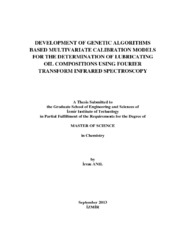Please use this identifier to cite or link to this item:
https://hdl.handle.net/11147/3657Full metadata record
| DC Field | Value | Language |
|---|---|---|
| dc.contributor.advisor | Özdemir, Durmuş | en |
| dc.contributor.author | Anıl, İrem | - |
| dc.date.accessioned | 2014-07-22T13:52:03Z | - |
| dc.date.available | 2014-07-22T13:52:03Z | - |
| dc.date.issued | 2013 | en |
| dc.identifier.uri | http://hdl.handle.net/11147/3657 | - |
| dc.description | Thesis (Master)--İzmir Institute of Technology, Chemistry, İzmir, 2013 | en |
| dc.description | Includes bibliographical references | en |
| dc.description | Text in English; Abstract: Turkish and English | en |
| dc.description | x, 66 leaves | en |
| dc.description.abstract | Engine oils consist of base oils and additives. There have been a number of changes in the composition of engine oils depending on the time and using conditions like the decrease in the aditive amounts and increase in the amount of oxidation products. Although there are many physical and chemical standard test methods for the determination of oil quality, none of these methods alone can be used to determine the whole composition of engine oils. The main objective of this work, is to develop a single anlytical method that is simple, rapid and accurate for the quantitative determination of lubricating oil compositions using Fourier transform infrared (FTIR) spectroscopy combined with chemometric multivariate data analysis. For this study, a number of most intensively produced engine oils are chosen in an industrial lubrication oil plant and then synthetic mixtures of oil components were prepared in order to develop multivariate calibration models. The FTIR spectra of these samples were recorded using a three reflection attenuated total reflectance (ATR) accessory. The collected spectral data and the reference concentration values of the samples are then used in multivariate calibration modelling step using a genetic algorithm based inverse leaast squares (GILS) calibration method. It was observed that the correlation coefficients between the reference concentration values and the GILS predicted concentrations were around 0.99. As a result, FTIR spectroscopy combined with multivariate calibration can be a rapid method for the quaantitative determination of engine oil compositions. | en |
| dc.language.iso | en | en_US |
| dc.publisher | Izmir Institute of Technology | en_US |
| dc.rights | info:eu-repo/semantics/openAccess | en_US |
| dc.subject.lcsh | Lubricating oils--Analysis | en |
| dc.subject.lcsh | Fourier transform infrared spectroscopy | en |
| dc.title | Development of genetic algorithms based multivariate calibration models for the determination of lubricating oil compositions using fourier transform infrared spectroscopy | en_US |
| dc.type | Master Thesis | en_US |
| dc.institutionauthor | Anıl, İrem | - |
| dc.department | Thesis (Master)--İzmir Institute of Technology, Chemistry | en_US |
| dc.relation.publicationcategory | Tez | en_US |
| item.languageiso639-1 | en | - |
| item.fulltext | With Fulltext | - |
| item.openairecristype | http://purl.org/coar/resource_type/c_18cf | - |
| item.openairetype | Master Thesis | - |
| item.grantfulltext | open | - |
| item.cerifentitytype | Publications | - |
| Appears in Collections: | Master Degree / Yüksek Lisans Tezleri | |
Files in This Item:
| File | Description | Size | Format | |
|---|---|---|---|---|
| T001195.pdf | MasterThesis | 1.73 MB | Adobe PDF |  View/Open |
CORE Recommender
Page view(s)
110
checked on Jul 22, 2024
Download(s)
56
checked on Jul 22, 2024
Google ScholarTM
Check
Items in GCRIS Repository are protected by copyright, with all rights reserved, unless otherwise indicated.